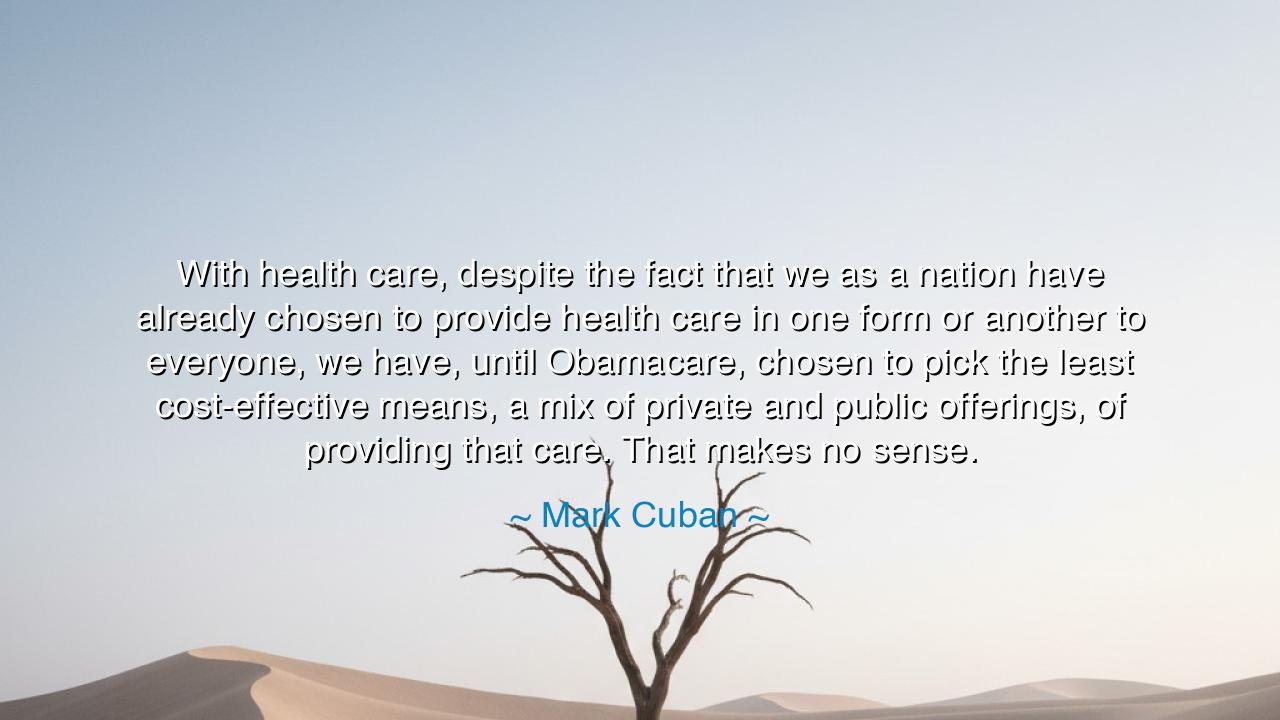
With health care, despite the fact that we as a nation have
With health care, despite the fact that we as a nation have already chosen to provide health care in one form or another to everyone, we have, until Obamacare, chosen to pick the least cost-effective means, a mix of private and public offerings, of providing that care. That makes no sense.






“With health care, despite the fact that we as a nation have already chosen to provide health care in one form or another to everyone, we have, until Obamacare, chosen to pick the least cost-effective means, a mix of private and public offerings, of providing that care. That makes no sense.” Thus spoke Mark Cuban, a voice of practicality and reason in an age when compassion and economics so often clash. His words cut through the fog of politics to expose a truth that has echoed through centuries of human governance — that when a society loses sight of efficiency and fairness in caring for its people, it pays twice: once in waste, and again in suffering. Cuban’s statement is not merely about policy; it is a lament for the imbalance between intention and execution, between what humanity wishes to do and how it chooses to do it.
In this quote, Cuban points to a paradox that has plagued modern civilization. Nations boast of their compassion, claiming to value health care as a universal right, yet they build systems that squander both wealth and well-being. He reminds us that America, like many nations before it, has already chosen — morally and socially — to care for its citizens in sickness. No one, he says, is truly left without care; they simply receive it through the most inefficient and fragmented path possible. Emergency rooms become sanctuaries for the desperate, costs are hidden behind bureaucracy, and the burden of inefficiency falls upon all. It is a system where the heart is willing but the mind is lost in confusion.
The ancients would have called this folly. In the teachings of the philosopher Aristotle, justice was not only about good intentions but also about wise organization — the harmony of moral will and practical reason. What Cuban observes is the modern version of an ancient imbalance: when compassion lacks wisdom, it becomes chaos. To mix public and private systems without unity of purpose is to build a ship with two rudders, each steering in its own direction. The result is drift, waste, and despair. True wisdom demands that the means serve the end — that the structure of care reflect the spirit of care.
Consider the story of Florence Nightingale, the Lady with the Lamp, who transformed the chaos of the Crimean War’s hospitals into havens of healing. She found men dying not from wounds but from inefficiency — from filth, confusion, and neglect. Yet she did not simply comfort them; she reformed the system itself. She measured, organized, and rebuilt, uniting compassion with logic. Her courage was not only in tending the sick but in demanding order from disorder, for she understood that to heal a person, one must also heal the structure that sustains them. In her legacy lies the truth of Cuban’s lament: care without efficiency is compassion diminished.
Cuban’s words also strike at the deeper heart of civilization — the duty of a people to be not only kind, but wise in their kindness. He reminds us that generosity is not enough; that even noble intentions, if pursued foolishly, can drain a nation’s vitality. A society that wastes its resources on convoluted systems cannot sustain its compassion for long. When the cost of care becomes unbearable, the spirit of unity fractures. Thus, efficiency is not a cold economic principle — it is a moral one. It ensures that the blessing of health flows to all, not merely to those who can endure the labyrinth of cost and access.
His statement about Obamacare — whether one agrees with its methods or not — points to an awakening: a recognition that the way we provide health is as vital as the health itself. It is a call for clarity over confusion, for unity over division. For as Cuban says, “that makes no sense” — a phrase that in its simplicity carries the weight of moral clarity. What he means is this: when a nation commits to the sacred task of healing, it must do so not half-heartedly or haphazardly, but with the same discipline and precision it would apply to its armies, its temples, or its dreams.
Therefore, O seekers of justice and wisdom, take this lesson to heart: compassion must be intelligent, and intelligence must be compassionate. To care for one another is divine, but to do so wisely is civilization itself. Whether in matters of health, education, or governance, do not settle for good intentions alone. Demand that the methods match the morality, that structure follows purpose, that the system uplifts rather than entangles.
For in the end, as Mark Cuban’s words remind us, inefficiency in the service of virtue is not virtue at all. To care well is to care wisely. To build a better world, one must build it not on sentiment alone, but on reason, order, and purpose — the pillars upon which both health and humanity can stand unshaken.






AAdministratorAdministrator
Welcome, honored guests. Please leave a comment, we will respond soon